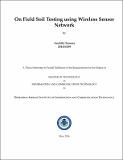Please use this identifier to cite or link to this item:
http://drsr.daiict.ac.in//handle/123456789/625Full metadata record
| DC Field | Value | Language |
|---|---|---|
| dc.contributor.advisor | Srivastava, Sanjay | |
| dc.contributor.author | Saxena, Anshiki | |
| dc.date.accessioned | 2017-06-10T14:44:52Z | |
| dc.date.available | 2017-06-10T14:44:52Z | |
| dc.date.issued | 2016 | |
| dc.identifier.citation | Anshiki Saxena (2016). On Field Soil Testing using Wireless Sensor Network. Dhirubhai Ambani Institute of Information and Communication Technology, viii, 59p. (Acc.No: T00588) | |
| dc.identifier.uri | http://drsr.daiict.ac.in/handle/123456789/625 | |
| dc.description.abstract | Soil nutrients analysis is an essential part of sustainable and productive agriculture.In order to get the effective and potential yield of crops, soil health card containingthe detailed report of soil fertility status are issued to the farmers basedon soil nutrients measurement. Soil health cards are generated using off field soiltestimg(i.e.soil analysis is performed in soil testing laboratories) approach but thelimitation of this approach lies in the fact that the whole process becomes timeconsuming and expensive. Hence On field soil nutrient analysis is an approachto obtain rapid, real-time and inexpensive measurement of soil nutrients. Thisapproach would be useful for proper management of soil fertility and in turn toincrease the profitability of crop production. We have designed and implementeda system for on field measurement of soil nutrients. Various sensor technologiese.g.optical sensing, electrochemical sensing etc. have been proposed for on fieldanalysis and estimation of soil nutrients. We have opted LED based colorimetertechnique based on optical sensing for on-site assessment of some of the majorsoil nutrients(Nitrogen, Phosphorus & Potassium). This approach works on colorimetericprinciple in which color developed of the soil sample solution is analyzedand evaluated by absorption analysis of light passed through sample. SoilpH, another primary nutrient is also measured through analog pH sensor. Afterperforming experiments through sensors we collected the raw data. Sensor�sraw data is associated with various kinds of errors e.g. modeling error, instrumenterror, relative error etc. so sensor needs to be calibrated. Therefore to getthe accuracy, a calibration model is generated using a linear least-square calibrationapproach by minimizing the error in measured data against the standarddata. The standard uncertainty that we obtained for the quantitative measurementof nitrogen, phosphorus, potassium and pH measurement after calibrationare 0.04, 7.29, 115.63 and 0.21 respectively. The average relative error, dueto the difference in the true concentration(standard) and the measured concentrationfor nitrogen, phosphorus, potassium and pH are 27.07%, 31.41%, 90%and 3.14%. We have also analyzed the changes in light intensity absorbed(i.e.absorbance) by the nutrient against temperature variation. The methodologyvapplied for measurement of soil nutrients is a low-cost, low-power, simple andportable. It can be effectively used for on-site real-time measurement of soil nutrients.A mobile based user interface for data collection, delivery and query hasalso been designed. | |
| dc.publisher | Dhirubhai Ambani Institute of Information and Communication Technology | |
| dc.subject | soil nutrients | |
| dc.subject | Soil Analysis | |
| dc.subject | Electrochemical Sensor | |
| dc.subject | Acoustic Sensor | |
| dc.subject | Mechanical Sensor | |
| dc.subject | Soil pH measurment | |
| dc.classification.ddc | 631.41 ANS | |
| dc.title | On Field Soil Testing using Wireless Sensor Network | |
| dc.type | Dissertation | |
| dc.degree | M. Tech | |
| dc.student.id | 201411039 | |
| dc.accession.number | T00588 | |
| Appears in Collections: | M Tech Dissertations | |
Files in This Item:
| File | Description | Size | Format | |
|---|---|---|---|---|
| 201411039.pdf Restricted Access | 1.6 MB | Adobe PDF |  View/Open Request a copy |
Items in DSpace are protected by copyright, with all rights reserved, unless otherwise indicated.
